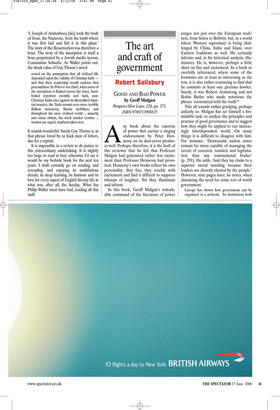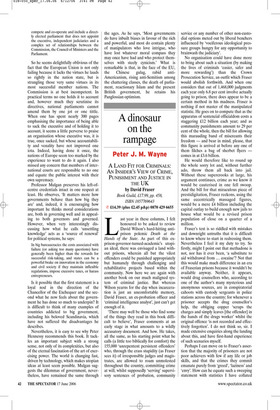The art and craft of government
Robert Salisbury
GOOD AND BAD POWER by Geoff Mulgan Penguin/Allen Lane, £20, pp. 373, ISBN 9780713998825 Any book about the exercise of power that carries a ringing endorsement by Peter Hennessy on its dust-cover promises well. Perhaps, therefore, it is the fault of this reviewer that he felt that Professor Mulgan had generated rather less excitement than Professor Hennessy had promised. Hennessy’s own books reflect his own personality: they fizz, they crackle with excitement and find it difficult to suppress whoops of laughter. Yet they illuminate and inform.
In this book, Geoff Mulgan’s remarkable command of the literature of power ranges not just over the European tradition, from Solon to Bobbitt, but, in a world where Western supremacy is being challenged by China, India and Islam, over Eastern traditions as well. He certainly informs and, in his historical analysis, illuminates. He is, however, perhaps a little short on fizz and excitement. In a book so carefully referenced, where some of the footnotes are at least as interesting as the text, it is also rather reassuring to find that he commits at least one glorious howler. Surely, it was Robert Armstrong and not Robin Butler who made notorious the phrase ‘economical with the truth’?
This all sounds rather grudging, perhaps unfairly so. Mulgan has set himself a formidable task: to analyse the principles and practice of good governance and to suggest how they might be applied to our increasingly interdependent world. On many things it is difficult to disagree with him. For instance: ‘Democratic nation states remain far more capable of managing the circuit of coercion, taxation and legitimation than any transnational bodies’ (p. 291). He adds, ‘And they lay claim to a superior moral standing because their leaders are directly elected by the people.’ However, nine pages later, he notes, when discussing the need for some sort of world government:
Europe has shown how government can be organised in a network. Its institutions both compete and co-operate and include a directly elected parliament that does not appoint the executive, independent judiciaries and a complex set of relationships between the Commission, the Council of Ministers and the Parliament.
So he seems delightfully oblivious of the fact that the European Union is not only failing because it lacks the virtues he lauds so rightly in the nation state, but is strangling those very same virtues in its most successful member nations. The Commission is at best incompetent. In practical terms no one holds it to account and, however much they scrutinise its directives, national parliaments cannot amend them by one jot or one tittle. When one has spent nearly 300 pages emphasising the importance of being able to sack the executive and of holding it to account, it seems a little perverse to praise an organisation whose executive was, it is true, once sacked, but whose accountability and venality have not improved one iota. Indeed, having done it once, the nations of Europe seem too marked by the experience to want to do it again. I also missed any concern that members of international courts are responsible to no one and equate the public interest with their own supremacy.
Professor Mulgan preserves his left-ofcentre credentials intact in one respect at least. He observes, ‘It matters more how governments behave than how big they are’ and, indeed, it is encouraging how important he thinks moral considerations are, both in governing well and in appealing to both governors and governed. However, when very interestingly discussing how what he calls ‘unsettling knowledge’ acts as a ‘source of renewal’ for political systems, he says:
In big bureaucracies the costs associated with failure (or asking too many questions) have generally been higher than the rewards for successful risk-taking, and states can be a powerful brake on innovation in the economy and civil society if they maintain inflexible regulations, impose excessive taxes, or harass entrepreneurs.
Is it possible that the first statement is a loyal nod in the direction of the Chancellor of the Exchequer and the second what he now feels about the government he has done so much to underpin? It is difficult to think of many examples of countries addicted to big government, including his beloved Scandinavia, which have not suffered the disadvantages he describes.
Nevertheless, it is easy to see why Peter Hennessy recommends this book. It tackles an important subject with a strong sense, not only of its complexities, but also of the eternal fascination of the art of exercising power. The world is changing fast, driven by technology, which makes utopian ideas at least seem possible. Mulgan suggests the dilemmas of government, nevertheless, have remained the same through the ages. As he says, ‘Most governments do have inbuilt biases in favour of the rich and powerful, and most do contain plenty of manipulators who love intrigue, who have lost whatever moral compass they may once have had and who protect themselves with steely cynicism.’ What is remarkable is that, in the face of the EU, the Chinese gulag, rabid antiAmericanism, rising anti-Semitism among the chattering classes, the death of parliament, reactionary Islam and the present British government, he retains his Panglossian optimism.



















































































 Previous page
Previous page